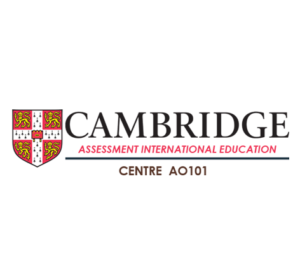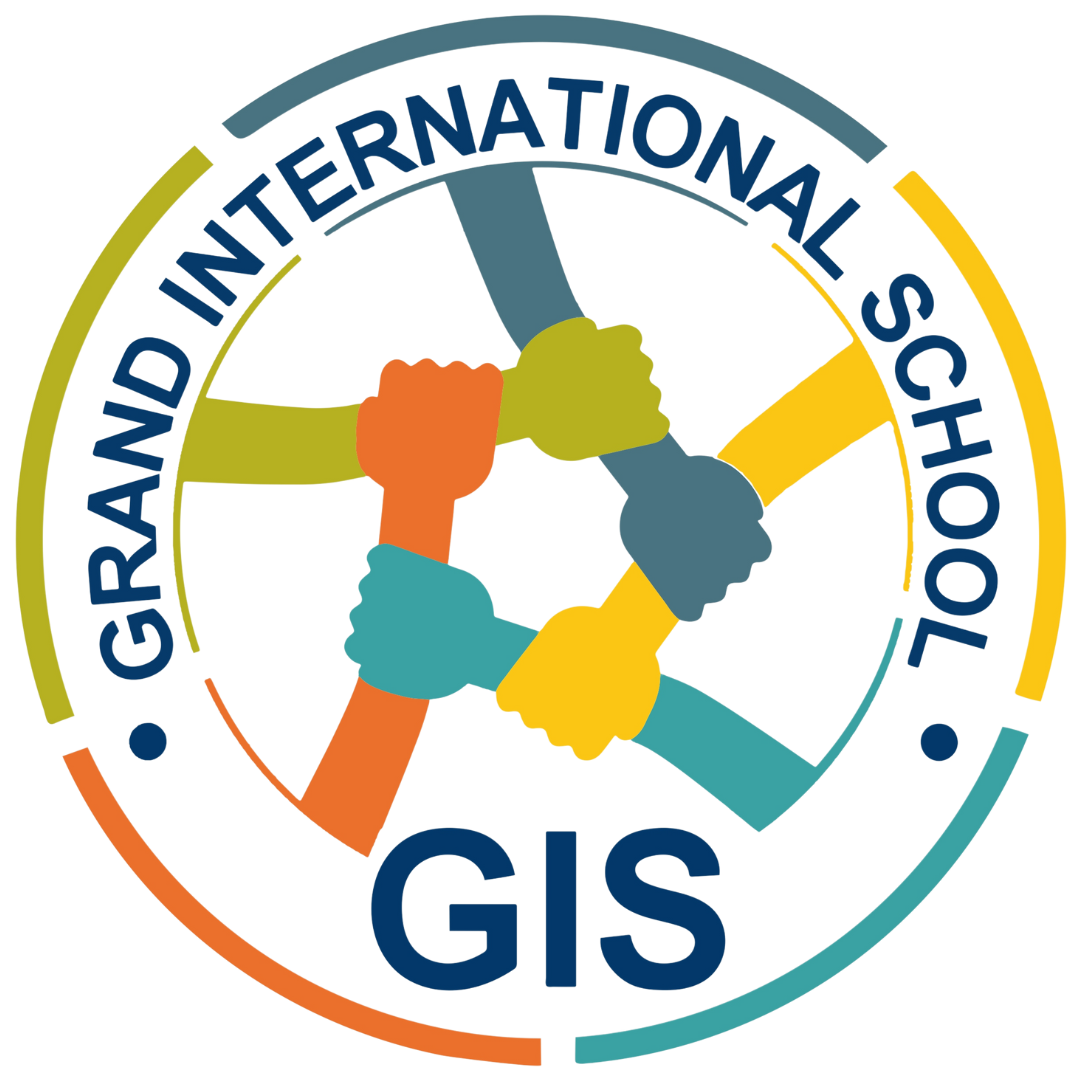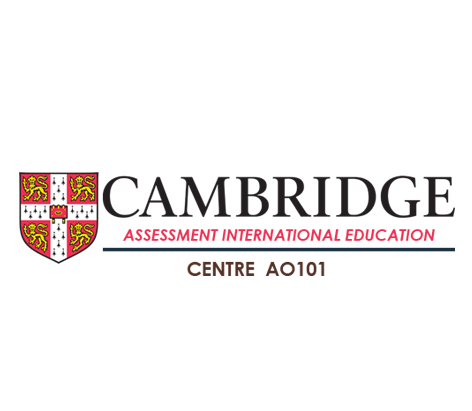Our Academics Offer
A Cambridge Assessment International Education
Benefits Of Cambridge In The Future
It prepares learners for life by fostering an informed curiosity and a lasting passion for learning.
Cambridge education connects learners to a global community through programmes like Global Perspectives, which enhance their understanding of worldwide issues.
A Cambridge education opens pathways to international universities and equips learners for a seamless transition into adulthood.

The Cambridge curriculum is designed to help schools develop and deliver a broad and balanced curriculum that builds skills across over nine subjects. Its core subjects include Mathematics, English, Science, and Global Perspectives, which is offered from Primary through Middle School. The curriculum’s flexibility allows for the integration of co-curricular subjects that suit different school contexts, cultures, and ethos. These subjects include Portuguese, Art and Design, Physical Education, Music, and Digital Literacy.
Cambridge is a curriculum that provides international qualifications to 10,000 schools in over 160 countries, catering to learners aged 5 to 19. It promotes an inquiry-based approach that develops thinking skills and encourages intellectual engagement. The curriculum is learner-centered and adopts a thematic approach, fostering critical thinking, personal growth, and intellectual curiosity.
Subjects We Offer
Mathematics (0845)
Mathematics (0845)
The Cambridge Primary Mathematics focuses on principles, patterns, systems, functions and relationships that develop holistic understanding in learners, enabling them to solve real life problems. It provides a solid foundation upon which the later stages of mathematical education can be built. This course supports progression to Cambridge Lower Secondary Mathematics. The curriculum is offered from Stages 1 to 6 and covers the following areas:
• Number
• Geometry
• Measure
• Handling Data
• Problem Solving
Science (0846)
Science (0846)
Cambridge Primary Science develops curiosity in Learners’ minds, helping them to investigate problems, learn more about the world around them, understand and use scientific explanations for a wide range of phenomena. The subject is offered from Stages 1 to 6. In every stage, learners develop their understanding of foundational concepts in Biology, Chemistry and Physics, which they will build on throughout the Cambridge Pathway. This course supports progression to Cambridge Lower Secondary Science.
The subject covers four content areas:
• Scientific inquiry
• Biology
• Chemistry
• Physics.
Scientific inquiry considers ideas, evaluating evidence, planning, practical investigations, recording, and data evaluation. It underpins Biology, Chemistry, and Physics, which are focused on developing confidence and interest in scientific knowledge, including environmental awareness and the history of science.
Global Perspectives (0838)
Global Perspectives (0838)
Cambridge Primary Global Perspectives subject is for learners aged 5 to 11 years. It develops the skills of research, analysis, evaluation, reflection, collaboration and communication, thereby strengthening the links across English, Mathematics, Science and Information Computer Technology. The programme is made up of a series of Challenges that prepares the learner for pre-requisite research skills required for There are six Challenges a year. Each Challenge is six hours long, subdivided into a range of activities, and covers a range of skills. The skills are taught through a wide range of topics using a personal, local and global perspective. Teachers help students to look at a variety of global issues or topics that give a range of contexts. This course supports progression to Cambridge Lower Secondary Global Perspectives.
English (0844)
English (0844)
Cambridge Primary English stimulates an enquiry-based approach, developing learners’ confidence, creativity and intellect. The subject is designed for learners who have English as a first language and can be used in any cultural context. Learners develop English skills and apply them in everyday life situations. This will promote confidence, critical skills in responding to a range of information and effective communication with understanding and satisfaction. This course supports progression to Cambridge Lower Secondary English. Divided into six stages (Stage 1 to 6), the curriculum framework covers knowledge, skills and understanding in the three strands:
• Reading
• Writing
• Speaking and listening
Digital Literacy (0072)
Digital Literacy (0072)
Digital literacy is an essential skill for learners of all ages, including the youngest ones. The digital world allows us to connect, collaborate, innovate and discover new information on an ever-broadening scale, and learners must be able to effectively use technology from the very beginning of their educational journey. Students develop digital skills that will help with many aspects of their future learning and development.
This course supports progression to Cambridge Lower Secondary Digital Literacy.
The following skills will be acquired by learners:
- Understanding their place, and the place of others, in an interconnected world and make educated decisions about the information that they encounter online.
- develop knowledge, understanding, and evaluation of recent technology for future improvements.
- develop skills to create increasingly sophisticated documents and presentations.
- learn how to become positive contributors to the digital world.
- use digital technology safely and protect their own physical and emotional well-being.
Art & Design (0067)
Art & Design (0067)
Cambridge Primary Art & Design gives learners the opportunity to express their ideas, creativity and artistic imaginations. The subject explores and push boundaries enabling learners to become innovative, reflective, critical, decisive and independent thinkers making it a tool for effective visual communication to exhibit real life experiences. The subject develops creative skills that will help with many aspects of their future learning and development. Cambridge Primary Art & Design is taught through a broad range of investigative, art-making and reflective activities. This course supports progression to Cambridge Lower Secondary Art & Design. These include the following study areas:
• painting
• print making
• model making
• digital art
• photography
• textiles and fashion
• graphic communication
Music (0068)
Music (0068)
Cambridge Primary Music is an interesting subject which develops social engagement, creativity, funny, respect, leadership, collaboration skills and self-confidence in learners by helping them to express themselves physically and emotionally. It shows the importance of communication through engagement with other musicians and audiences. Learners explore music as performers, composers and informed listeners. They make, understand and appreciate music from different cultures, times and places. Learners can perform through singing and playing various musical instruments with an appreciation and evaluation between old and modern technology. The programme is designed to complement, rather than replace, instrumental or singing lessons. This course supports progression to Cambridge Lower Secondary Digital Literacy.
Physical Education (0069)
Physical Education (0069)
Cambridge Primary Physical Education is an important part of a balanced school curriculum. Establishing good patterns of exercise in primary school provides learners with an active physical, social and mental healthy lifestyle. The learners develop skills through various age-appropriate physical activities, including games, gymnastics and dance. Learners study as individuals and team members to increase confidence, esteem, creative thinking, responsibility, fluency and understanding of concepts, rules, tactics, strategies and compositional ideas. Students develop creative skills that will help with many aspects of their future learning and development. The course supports progression to Cambridge Lower Secondary Physical Education.
Extracurricular Activities
Extracurricular Activities
At Grand International School, we believe in holistic development beyond academics. Our diverse extracurricular activities provide students with opportunities to explore their talents, develop new skills, and build confidence in a supportive environment in the following areas:
- Sports & Physical Education
- Music & Performing Arts
- Language & Literature Clubs
- Social & Life Skills
GIS ensures every student has the chance to discover their passion and grow into a well-rounded individual.
Swimming Classes
Swimming Classes
Swimming is more than just a sport at Grand International School; it’s an essential life skill. Our swimming classes provide students with the opportunity to learn water safety, build physical strength, and boost confidence in the pool. Guided by certified instructors, students progress at their own pace in a safe and supportive setting.
Key Highlights:
Focus on water safety, basic strokes, and breathing techniques
Classes for all skill levels, from beginners to advanced swimmers
Promotes physical fitness, coordination, and endurance
Portuguese Classes
Portuguese Classes
At Grand International School, we recognize the importance of linguistic diversity. Our Portuguese classes are designed to help students develop strong language skills, fostering fluency in reading, writing, speaking, and comprehension. Through interactive lessons, storytelling, and engaging activities, learners gain confidence in using Portuguese both academically and in daily life.
Key Highlights:
Focus on vocabulary, grammar, and conversation
Culturally rich lessons to connect language with real-life experiences
Supportive environment for both beginners and advanced learners

